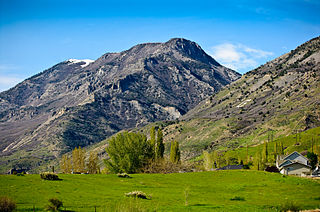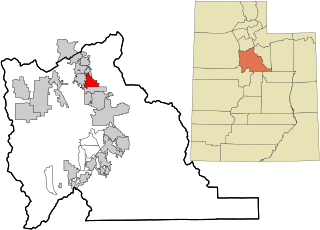Related Research Articles

Utah County is a county in the U.S. state of Utah. As of the 2010 United States Census, the population was 516,564, thus making it Utah's second-most populous county. The county seat and largest city is Provo, which is the state's third-largest city.

Provo is the third-largest city in Utah, United States. It is 43 miles (69 km) south of Salt Lake City along the Wasatch Front. Provo is the largest city and county seat of Utah County. It is home to Brigham Young University (BYU) and Sundance Resort is located just northeast of the city.

Lehi is a city in Utah County, Utah, United States. It is named after Lehi, a prophet in the Book of Mormon. The population was 47,407 at the 2010 census, up from 19,028 in 2000. A more recent 2019 estimate reports a population of 69,724. The rapid growth in Lehi is due, in part, to the rapid development of the tech industry region known as Silicon Slopes. The center of population of Utah is located in Lehi.

Lindon is a city in Utah County, Utah, United States. It is part of the Provo–Orem, Utah Metropolitan Statistical Area. The population was 10,070 at the 2010 census. In July 2018 it was estimated to be to 10,970 by the US Census Bureau.

Pleasant Grove, originally named Battle Creek, is a city in Utah County, Utah, United States known as "Utah's City of Trees". It is part of the Provo–Orem Metropolitan Statistical Area. The population was 33,509 at the 2010 Census.

Utah Valley University (UVU) is a public university in Orem, Utah. UVU offers master's, bachelor's, and associate degrees. Previously called Utah Valley State College, the school attained university status in July 2008.

Utah Valley is a valley in North Central Utah located in Utah County, and is considered part of the Wasatch Front. It contains the cities of Provo, Orem, and their suburbs, including Alpine, American Fork, Cedar Hills, Elberta, Elk Ridge, Genola, Goshen, Highland, Lehi, Lindon, Mapleton, Payson, Pleasant Grove, Salem, Santaquin, Saratoga Springs, Spanish Fork, Springville, Vineyard and Woodland Hills. It is known colloquially as "Happy Valley".
The Daily Herald is a daily newspaper that covers news and community events in Utah County, central Utah. Much of the coverage focuses on the Provo-Orem metropolitan area in Utah Valley.

FrontRunner is a commuter rail train operated by the Utah Transit Authority that operates along the Wasatch Front in north-central Utah with service from Ogden in central Weber County through Davis County, Salt Lake City, and Salt Lake County to Provo in central Utah County.
Alpine School District is the primary school district in northern Utah County, Utah, United States, including the cities of Alpine, American Fork, Cedar Fort, Cedar Hills, Eagle Mountain, Fairfield, Highland, Lehi, Lindon, Orem, Pleasant Grove, Saratoga Springs, and Vineyard. It includes all grades from kindergarten all through high school (K-12). As of 2019, there were 59 elementary schools, 13 junior high schools, 10 high schools, and 8 special purpose schools serving approximately 78,659 students, making it the largest school district in Utah.
Sensory Sweep Studios was an American developer of video games. The studio was located in Salt Lake City, Utah.

The Provo-Orem, UT Metropolitan Statistical Area, as defined by the United States Office of Management and Budget, is an area consisting of two counties in Utah, anchored by the cities of Provo and Orem. As of the 2010 census, the MSA had a population of 526,810. By 2015, the Census Bureau estimated the population reached 585,799.

Lake Side Power Station is a natural gas turbine power station at Vineyard, Utah, United States. It was built by Lake Side Power LLC. with Siemens Westinghouse Power Corporation and is operated by PacifiCorp which does business in Utah as Rocky Mountain Power.

As of June 5, 2019, The Church of Jesus Christ of Latter-day Saints reported 2,109,578 members living in Utah in 596 stakes, one district, 5,146 congregations, and eleven missions. As of April 2020, there are 24 temples operating, under construction, or announced in Utah.

Lego Bionicle: Quest for the Toa is an action-adventure game based on the Bionicle franchise. It was developed by Saffire Corporation, published by Lego Software and distributed in North America by Electronic Arts. It was released for the Game Boy Advance in October 2001. It was originally titled Lego Bionicle: Tales of the Tohunga, which was later changed due to legal issues with the Māori people of New Zealand.

Around the World in 80 Days is a video game developed by Pick Up & Play for Mobile phones, and by Saffire Corporation for Game Boy Advance. It is an adaptation of the 2004 film of the same name starring Jackie Chan. The game features pre-rendered characters and graphics, and a password feature for returning to specific levels.

Altabank is a full-service bank headquartered in American Fork, Utah, United States, that was formerly known as People's Intermountain Bank. It is owned by a publicly held holding company, People's Utah Bancorp, which is traded on NASDAQ as PUB. It is the second-largest bank headquartered in Utah, and has 26 branches serving businesses and individuals in the area from Preston, Idaho to St. George, Utah. The current bank was formed from mergers of separate institutions including Bank of American Fork, Lewiston State Bank, and People's State Bank of American Fork These themselves had grown by opening new branches and by acquisitions, including, in the case of Bank of American Fork, by its acquisition of branches from Banner Bank.

The Mount Timpanogos Transit Center was a staffed, open air bus transfer station in southeast Orem, Utah, United States. It functioned as both the Utah Transit Authority's (UTA) customer service center for Utah County, as well as a bus transfer center for UTA's buses in east central Utah Valley. Prior to the opening of the FrontRunner commuter rail extension south to Provo in 2012), it was the busiest bus stop within the entire UTA bus system.

Lego Bionicle: The Legend of Mata Nui is a canceled action-adventure video game developed by Saffire Corporation. Based on the Lego Group's Bionicle line of constructible action figures, the game was intended to release on Microsoft Windows computers in late 2001 and the GameCube in early 2002. The game was designed as a direct sequel to Saffire's Game Boy Advance game Lego Bionicle: Quest for the Toa, which was released in October 2001. The story of The Legend of Mata Nui was meant to serve as a conclusion to the 2001 Bionicle story arc, focusing on the Toa, heroic elemental warriors destined to defeat the evil Makuta, who is attacking the island of Mata Nui with corrupted Rahi animals.
References
- 1 2 3 4 5 6 7 8 Pusey, Roger (December 24, 1997). "UTFC helps Saffire Corp. grow like a house a-fire". Desert News . Archived from the original on June 20, 2020. Retrieved June 20, 2020.
- 1 2 "Cygnus Multimedia Gets Recognition – and a New Name". Deseret News . October 25, 1995. Archived from the original on June 20, 2020. Retrieved June 20, 2020.
- 1 2 3 4 Romboy, Dennis (February 22, 1995). "Cygnus Takes Place Among 'the Stars'". Deseret News . Archived from the original on June 20, 2020. Retrieved June 20, 2020.
- ↑ Haddock, Sharon (February 3, 1999). "'Motion capture' nets growth for company – Saffire Corp. puts realistic moves in lot of video games". Deseret News . Archived from the original on June 20, 2020. Retrieved June 20, 2020.
- ↑ Christiansen, Barbara (January 20, 1999). "Saffire Corp. brings video game development to P.G." American Fork Citizen. p. 15. Archived from the original on June 20, 2020. Retrieved June 20, 2020– via Newspapers.com.
- ↑ Strickland, Tosha (December 12, 1999). "Saffire". Daily Herald . p. 26. Archived from the original on June 20, 2020. Retrieved June 20, 2020– via Newspapers.com.
- ↑ McDermott, Tara (July 6, 2001). "LEGO builds ties with Utah company". Daily Herald . Archived from the original on June 20, 2020. Retrieved June 20, 2020.
- ↑ House, Dawn (March 15, 2007). "SLC is video game capital of America". The Salt Lake Tribune . Archived from the original on June 20, 2020. Retrieved June 20, 2020.